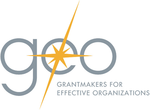
The Learning Conference 2011
June 6–7, 2011
Baltimore, MD
Short Talk — Innovations for Scaling Impact: What Have We Learned and Where Do We Go Now?
Session description
Going to scale is a priority of stakeholders across public and private sectors around the world. It is an increasing focus of grantmakers in the U.S. and abroad. Have we learned anything about scale over the past several years? What good practices beyond program replication or organizational growth have emerged to scale impact? Sanjeev Khagram will argue that the time is ripe for foundations to catalyze a field-wide collaborative research, development and continuous improvement system that can drive innovations for scaling impact.
Participant learning goals
• Hear about exciting cases of initiatives that have scaled impact
• Explore lessons learned about mechanisms for scaling impact
• Discuss how funders can learn and act together to scale impact
Intended learning level
Activation — exposure to new ideas you maybe haven’t heard before
Speakers
![Sanjeev Khagram, Innovations for Scaling Impact [photo]](https://5d67d7d2fab6aa2c003d-a12b070af57c9bbc32c5a41a66298b76.ssl.cf1.rackcdn.com/31/profile_c2f53c333dca4633fb01c58c227bd813.png)
Sanjeev Khagram, Innovations for Scaling Impact
Web site
Speaker Biography
Sanjeev Khagram is a professor of public affairs and international studies at the University of Washington and lead steward at Innovations for Scaling Impact. Khagram was selected as a Young Global Leader of the World Economic Forum and was lead author of the UN Secretary General’s Report on the Impacts of the Global Economic Crisis on the Poor in 2009. In past roles, he was the Wyss Visiting Scholar at the Harvard Business School’s Social Enterprise Initiative, associate professor at Harvard University's Kennedy School, dean of the Desmond Tutu Peace Centre, and senior policy and strategy director at the World Commission on Dams. Khagram has published extensively, worked across sectors and all over the world, is of Asian Indian descent, and was born and was a refugee of Uganda from the Idi Amin regime.